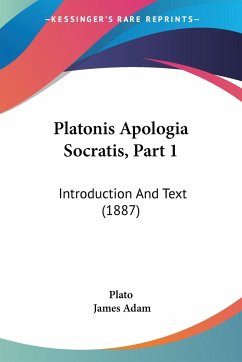
Platonis Euthyphro (1890)
Versandkostenfrei!
Versandfertig in 1-2 Wochen
23,99 €
inkl. MwSt.

PAYBACK Punkte
12 °P sammeln!
Platonis Euthyphro is a book written by the ancient Greek philosopher Plato, first published in 1890. The book contains a dialogue between Socrates and Euthyphro, a young man who claims to have knowledge of piety and impiety. Socrates questions Euthyphro's understanding of these concepts and challenges him to provide a clear definition. Throughout the dialogue, the two engage in a philosophical debate about the nature of piety and impiety, morality, and the role of the gods in human affairs. The book is considered a classic of Western philosophy and is widely studied in philosophy courses arou...
Platonis Euthyphro is a book written by the ancient Greek philosopher Plato, first published in 1890. The book contains a dialogue between Socrates and Euthyphro, a young man who claims to have knowledge of piety and impiety. Socrates questions Euthyphro's understanding of these concepts and challenges him to provide a clear definition. Throughout the dialogue, the two engage in a philosophical debate about the nature of piety and impiety, morality, and the role of the gods in human affairs. The book is considered a classic of Western philosophy and is widely studied in philosophy courses around the world. It offers valuable insights into the ancient Greek worldview and the development of philosophical thought, and remains a relevant and thought-provoking text for modern readers.This scarce antiquarian book is a facsimile reprint of the old original and may contain some imperfections such as library marks and notations. Because we believe this work is culturally important, we have made it available as part of our commitment for protecting, preserving, and promoting the world's literature in affordable, high quality, modern editions, that are true to their original work.












